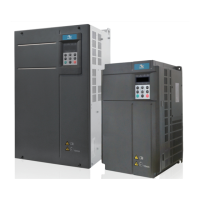- 11 -
2. Thermal protection of the motor
If the rated capacity of the motor does not match that of the servo drive, adjust the motor protection
parameters on the operation panel or install a thermal relay in the motor circuit for protection. It is especially
important to take this precaution if the servo drive has a higher power rating than the motor.
3. Motor heat and noise
The output of the servo drive is pulse width modulation (PWM) wave with certain harmonic frequencies, and
therefore, the motor temperature, noise, and vibration are slightly greater than those when the servo drive runs
at the mains frequency.
4. Voltage-sensitive device or capacitor on the output side of the servo drive
Do not install a capacitor for improving power factor, or a voltage sensitive resistor for lightning protection, on
the output side of the servo drive. This is because the output is a PWM waveform and the servo drive might
suffer transient overcurrent or become damaged.
Figure 1-2 Disallowed connections to the servo drive output
5. Contactor at the input terminal of the servo drive
If there is a contactor installed between the input side of the servo drive and the power supply, DO NOT use it
to start or to stop the servo drive. However, if there is a real and urgent need to use the contactor to start or to
stop the servo drive, make sure the time interval between switching is at least one hour. If the interval between
switching is shorter than one hour, this will reduce the service life of the capacitor inside the servo drive.
Figure 1-3 Input contactors
380Vac
50/60Hz
Do not start or stop the servo drive by switching
The input contactor. If you must operate the servo
drive by using the input contactor, wait at least
one hour between switching operations.
R
S
T
V
W
U
Contactor KM
M
Servo
drive

